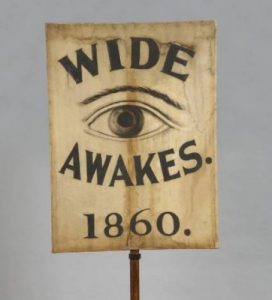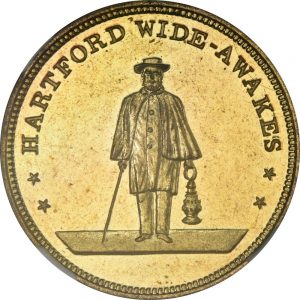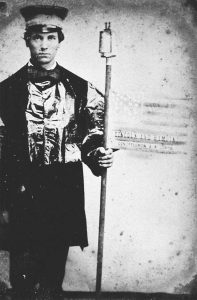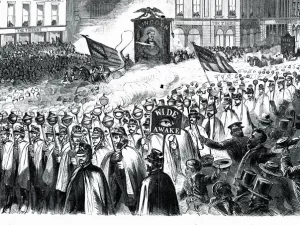Being Wide Awake Today is Woke
 Amazing, isn’t it, how everything old is new again? The worst insult or highest compliment in use today is probably some version of the word “woke.” Depending on which side one lands politically, it can mean either being sensitized to the issues of injustice or being a tool of the Left, unable to make up one’s mind without consulting political correctness. A quick look at the Internet offers several articles indicating that the origin of the term woke is African American Vernacular English. Several examples are presented, including song lyrics from Erykah Badu’s “Master Teacher” (2008).[i]
Amazing, isn’t it, how everything old is new again? The worst insult or highest compliment in use today is probably some version of the word “woke.” Depending on which side one lands politically, it can mean either being sensitized to the issues of injustice or being a tool of the Left, unable to make up one’s mind without consulting political correctness. A quick look at the Internet offers several articles indicating that the origin of the term woke is African American Vernacular English. Several examples are presented, including song lyrics from Erykah Badu’s “Master Teacher” (2008).[i]
Author Kate Eagels goes further back–to 1938. In her post on yahoo/news, she explains that Huddie Ledbetter (aka Lead Belly) used the phrase “stay woke” when he introduced the song “Scottsboro Boys,” a protest song concerning nine black teenagers who were falsely accused of raping two white women on a train in Scottsboro, Alabama, in 1931. “I made this little song about down there,” Lead Belly says. “So, I advise everybody, be a little careful — best stay woke, keep their eyes open.” Engels also references a 1962 article in the New York Times by novelist William Melvin Kelly: “If You’re Woke, You Dig It,” in which he describes a ‘woke’ person as someone aware of the experiences of black people in the United States.[ii]
All the descriptions of the term refer to it as slang. This puts an extra onus on researchers to prove the word’s origin. Words spoken before they are written have a longer life than one might imagine. Slang terms often have checkered pasts but always indicate time, place, and the humanity of those who used them. This blog post’s position is that being woke goes all the way back to the 1850s and helped elect Republican candidate Abraham Lincoln.
 Before Lincoln, Kentucky anti-slavery politician Cassius Clay was booked to speak in Hartford, Connecticut, on February 25, 1860. Hartford was considered a safe place for Clay, but a group of young dry goods clerks decided they would make it safer. They organized a torchlight parade to escort Clay to his speaking place. “Someone improvised a cape, made from oilcloth, to protect his clothes from the dripping oil of the torches. He was quickly imitated – a dashing new look was born.” By the end of the next week, the first of oh-so-many northern Wide Awake clubs was formed.[iii]
Before Lincoln, Kentucky anti-slavery politician Cassius Clay was booked to speak in Hartford, Connecticut, on February 25, 1860. Hartford was considered a safe place for Clay, but a group of young dry goods clerks decided they would make it safer. They organized a torchlight parade to escort Clay to his speaking place. “Someone improvised a cape, made from oilcloth, to protect his clothes from the dripping oil of the torches. He was quickly imitated – a dashing new look was born.” By the end of the next week, the first of oh-so-many northern Wide Awake clubs was formed.[iii]
The initial membership of thirty-six young men agreed to purchase their own capes and torches, which arrived just in time for the next deadline of March 5. This time the speaker was a tall, thin man from Illinois. He had just finished giving a spectacular speech at New York City’s Cooper Union, and as one observer put it, the “presidential bee” had begun to buzz around him.[iv] That evening, the young Hartford Wide Awakes put on their capes, fired up their torches, and walked with Abraham Lincoln to the home of Hartford mayor Thomas Allen. The optics were–and still are–astounding: handsome young men wearing jaunty military caps and swinging, shimmering oilcloth capes, carrying twinkling oil torches and large banners with painted eyeballs, all marching down the street in military cadence, and in total silence. Obviously, these fellows were woke.[v]
In 1860 America was a youthful country. 51% of its population was 19 years of age or younger. For as long as these Americans could remember, the government in Washington had been controlled by powerful enslavers. They were a lobby whose entry into the halls of power was heralded by the stink of corruption. Second-rate presidents sniffed around a corrupt House and Senate, signing racist legislation, and appointing corrupt men to important positions. Finally, the nascent Republican party and their presidential candidate, Abraham Lincoln, rose in protest. Now they were being joined in great numbers by young men and women. An editor at the Atlantic Monthly wrote that the time had come to decide, once and for all, “whether the American idea is to govern this continent.” First hundreds, then thousands of Wide Awakes poured into the streets of the American North in 1860.[vi]
younger. For as long as these Americans could remember, the government in Washington had been controlled by powerful enslavers. They were a lobby whose entry into the halls of power was heralded by the stink of corruption. Second-rate presidents sniffed around a corrupt House and Senate, signing racist legislation, and appointing corrupt men to important positions. Finally, the nascent Republican party and their presidential candidate, Abraham Lincoln, rose in protest. Now they were being joined in great numbers by young men and women. An editor at the Atlantic Monthly wrote that the time had come to decide, once and for all, “whether the American idea is to govern this continent.” First hundreds, then thousands of Wide Awakes poured into the streets of the American North in 1860.[vi]

Just as the “woke” of today use the Internet, the Wide Awake clubs used technology to spread their ideas across the North. A comic book, “Pipp Among the Wide Awakes,” was widely distributed. Partisan newspapers brought the Wide Awake message to the entire North. Republican papers printed announcements of parades and meetings. Editorials successfully called for more clubs to be created. The organizations “exploded across the nation,” in the words of historian Jon Grinspan.[vii] When the Republican National Convention ended in Chicago, that city had at least forty-eight clubs. As young men returned from the convention, they organized Wide Awake clubs in Madison, Wisconsin; Columbus and Cleveland, Ohio; Newark, New Jersey; Brooklyn, New York; and Bangor, Maine. They used these new communication networks to whip up excitement and awaken the North to the current political possibilities. According to historian and author of Lincoln on the Verge: Thirteen Days to Washington, Ted Widmer, “They thrilled onlookers with huge nighttime parades, fireworks added to the torchlight, and ‘moving transparencies”‘ like slide shows, a distant ancestor of what would become cinema.”[viii]
Republican Party leaders adapted their own message–Vote for Lincoln–to the movement, which peaked as the election approached. In Detroit, William Seward gave a speech promising that “the young men throughout the land are Wide Awake.” Lincoln’s running mate, Hannibal Hamlin, marched through the streets of Boston with “the boys.” Then, on October 3, a vast torchlight procession and pyrotechnic display dazzled New York City.[ix] Tens of thousands attended, and by the next day, the newspaper culture had spread the word: The North was “Woke” or at least Wide Awake enough to severely upset Southern interests and elect a president who would lead America into the future.
Everything old is new again. And now, as then, the biggest danger seems to be what happens when none of us are woke.

_____________________________________________________________
[i] https://www.merriam-webster.com/words-at-play/woke-meaning-origin.
[ii] https://news.yahoo.com/what-does-woke-mean-155321566.html?fr=yhssrp_catchall and https://adeptales.com/2021/03/war-on-woke/
[iii] Ted Widmer, “Wide Awakes: the Lincoln-era youth movement inspiring Trump protests,” (October 17, 2020), https://www.theguardian.com/us-news/2020/oct/17/wide-awakes-lincoln-era-youth-movement-trump
[iv] Ibid.
[v] Ibid, and Jon Grinspan, “Young Men for War”: The Wide Awakes and Lincoln’s 1860 Presidential Campaign,” Journal of American History, 96 (September 2009) 357-78.
[vi] Widmer, https://www.theguardian.com/us-news/2020/oct/17/wide-awakes-lincoln-era-youth-movement-trump
[vii] Grinspan
[viii] Widmer, https://www.theguardian.com/us-news/2020/oct/17/wide-awakes-lincoln-era-youth-movement-trump
[ix] Ibid.
Wow Meg, great work. Your mention of the use of the term woke as slang had me thinking about the term wide-awake and whether it was also considered slang. I actually have a copy of the Dictionary of Historical Slang, which has an entry for wide-awake:
wide-awake: “Sharp-witted; alert” The book notes its first use as slang about 1833 and its use as a colloquialism around 1860.
Defined from Eric Partridge, The MacMillan Dictionary of Historical Slang, (New York: MacMillan Publishing Company, 1974 abridged edition), 1047.
Interesting attempt to juxtapose two utterly different eras. And as far as the Era of Powerful Enslavers argument goes, it’s a slander to many superb office holders of the time, as well as slaveholding Presidents like Jackson and Taylor who often steered against the current. The truest result of organizations, North and South, like the Wide Awakes was the militarization of society and an increased willingness to use violence to achieve one’s ends
Thank you for this article. One of the things I like about this website is the variety of views and areas of scholarship. Before reading this article, I knew very little about the wide awakes beyond their existence. It is notable that the wide awakes were originally organized to protect Cassius Clay’s right to free speech. In today’s rush to deplatform and silence opponents, that is a worthy activity.
Terrific post, Meg. The use of historical terminology has long been a practice of political leaders to draw on the deep well of public emotions like patriotism and allegiance to frame those experiences for our times. Using our past to help understand our present is a valuable tool when employed with solid, balanced scholarship. When such comparisons are used for purely political purposes, cherry-picking facts and skewing events to support Lost Cause mythology or American exceptionalism or jingoism, we go off the rails. If we let a desire to be “woke” exceed our commitment to truly understanding the past, we end up with overwrought and sometimes blatantly counterfactual revisionism like the 1619 Project .Shrugging off our history of institutional racism as a different era and using the hackneyed “men of their times” defense to excuse nineteenth century political leaders for supporting patently immoral practices such as chattel slavery inhibits our understanding of history and the potential to use those insights to become a better nation and people. Being a “woke” historian today means discarding our filters and going back to the primary sources to evaluate what really happened and why, in the words of those who were there, both political elites and common citizens.